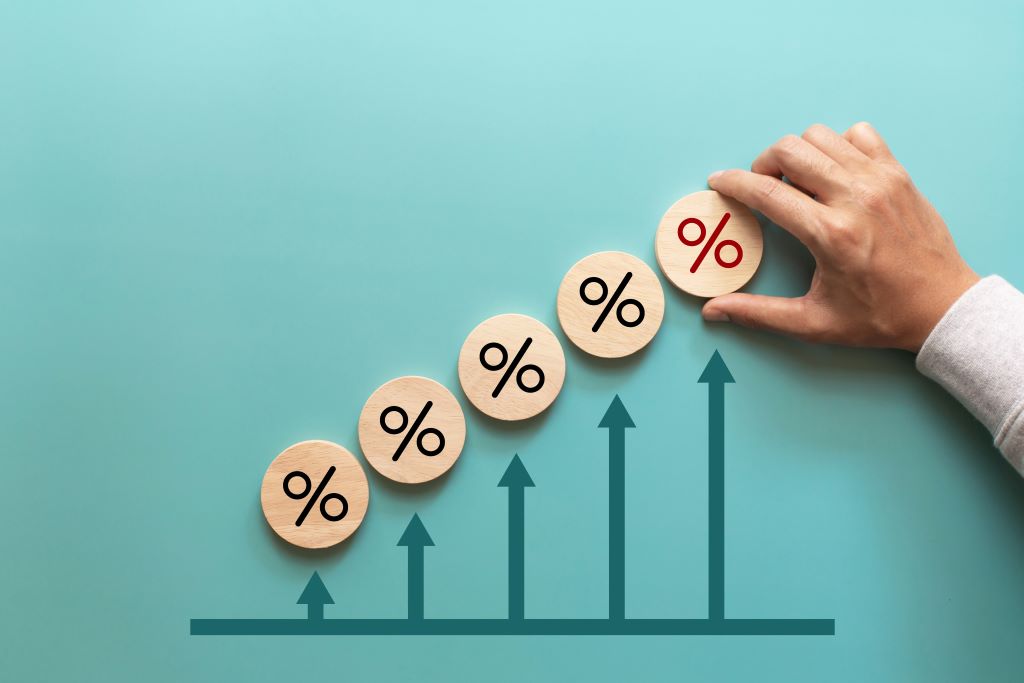Interest rates don’t just play a large role in the economy. They affect your personal finances too. Interest rates influence things like mortgages, loans, credit cards and investments. So, it’s important to understand how they work. You may have noticed a pattern of rising interest rates from the Federal Reserve over the past few years. This increase has affected the finances and credit of millions of Americans. If you have a mortgage, student loan, or car loan, an interest rate increase can affect your life too. So, if you’re well informed on the topic, it can help you make better decisions about your finances.
In this guide, we’ll break down what interest rate increases mean, why they happen, and how they can influence your day-to-day financial decisions. Keep reading if you want to learn more!

What Are Interest Rates and Why Does an Interest Rate Increase?
Before we dive in, it’s important to understand what interest rates are and why they rise in the first place. Interest rates are basically what it costs you to borrow money. When you take out a loan or use a credit card, the interest rate is the percentage charged on the amount you borrow. The Federal Reserve sets rates depending on the type of loan, which can fluctuate based on the economy.
The Federal Reserve tends to raise interest rates to control inflation and help stabilize the economy. When the economy is growing rapidly, higher interest rates can slow down spending and borrowing. In this case, interest rate increases can help keep prices in check. On the other hand, when the economy slows, the Federal Reserve may lower interest rates. Remember in 2020 and 2021, when mortgage rates dropped below 3% and the nation saw a boom in the housing market?* This is an example of how lowering interest rates encourages people to borrow and spend, which helps to stimulate growth in the economy.
But what does it mean for you and your finances when there’s an increase in interest rates?
How an Interest Rate Increase Can Affect Your Finances
Interest rates affect more than you may think. Here are a few examples of how an interest rate increase could affect your finances:
Higher Borrowing Costs Lead to More Expensive Loans
Increased interest rates almost always result in more expensive loans for any bank that’s borrowing from the Federal Reserve. This is because one of the quickest effects of an interest rate increase is higher borrowing costs. If you have a variable-rate loan, like a credit card or adjustable-rate mortgage, you’ll likely see your interest payments increase. Even new fixed-rate loans may have higher rates compared to years before.
Instead of taking the brunt of the cost on themselves, banks typically pass on the costs to customers. Unfortunately, any customers that have subpar credit may be impacted much more by these increases.
But interest rate increases don’t just happen with banks! You could experience the same from credit card companies. So, don’t be surprised if you see an increase in your credit card interest rates, minimum monthly payment amounts, and even late fees.

Credit Card Debt Becomes More Expensive
Most credit cards have variable interest rates, or interest rates that can change over time.* This means they’re directly influenced by changes in the federal funds rate. When interest rates rise, your credit card APR (Annual Percentage Rate) will typically also increase. This will make any outstanding balance more expensive to carry. It can be really concerning if you’re only making minimum payments, as more of your money will go towards interest rather than paying down the principal.
If you have high-interest debt, such as credit card balances, try to pay them off as soon as you can. The longer you carry a balance, the more expensive it can become when interest rates increase. So, try to prioritize paying off the highest interest debt first.
Impact on Savings and Investments
Higher interest rates can be a good thing for savers. This is because banks tend to raise rates on savings accounts, CDs (Certificates of Deposit), and other fixed-income investments. The good news is this means you can earn more on the money you have in these accounts.
However, rising rates can also negatively impact the stock market. Higher borrowing costs can reduce corporate profits. This can lead to lower stock prices. If you have a lot of investments in equities, you might see your portfolio’s value fluctuate or decline when interest rates spike.

Potential Changes in Employment and Economic Growth
When interest rates increase, borrowing costs for businesses typically also rise. This can lead to companies delaying or canceling expansion plans, reducing hiring, or even cutting jobs. Have you noticed how high interest rates have been lately? Have you also noticed the mass layoffs happening lately?* Do you see the connection here? If economic growth slows enough, it could lead to a recession. And recessions are known to have big impacts on employment and consumers’ spending habits.
Less Disposable Income
With higher borrowing costs, you suddenly have less money left to spend on groceries and other necessities. So, now would be a good time to review your budget. Look for areas where you can cut back or adjust your spending habits. Since your mortgage, phone bill, and car payments are some of the priority bills each month, you’ll need to keep an eye on your other finances. Consider tightening your budget and try not to use your credit cards. This can help you avoid spending extra money on interest.
Rising Costs for Existing Debt
Be aware of your debt! If you already have debt, such as a student loan or car payment, tied to a variable rate, your monthly payments may increase as interest rates rise. This can make it more challenging to keep up with your payments, especially if your income isn’t increasing at the same pace.
Easier to Get a Loan
Since loans suddenly become more expensive because of increased interest rates, less people tend to apply for them. To make sure they’re still giving out a large volume of loans, banks make it slightly easier for the average person to get approved. An effect of interest rate increases may be that banks take on riskier loan approvals for those with poor credit.
Be Prepared for When an Interest Rate Increase Happens
Fluctuations with the economy are normal, and interest rate increases are a natural part of that economic cycle. But it’s important to remember they can have a serious impact on your finances. So, by understanding how these changes affect borrowing, saving, and investing, you can be better prepared. Being proactive—whether that’s boosting your savings or adjusting your budget—can help you stay on top of things, no matter how the economy changes.
High-interest loans can be expensive and should be used only for short-term financial needs, not long-term solutions. Customers with credit difficulties should seek credit counseling. The opinions expressed above are solely the author’s views and may or may not reflect the opinions and beliefs of the website or its affiliates. Cash Factory USA does not provide financial advice.
* This blog contains links to other third-party websites that are not endorsed by, directly affiliated with, or sponsored by Cash Factory USA. Such links are only for the convenience of the reader, user, or browser.